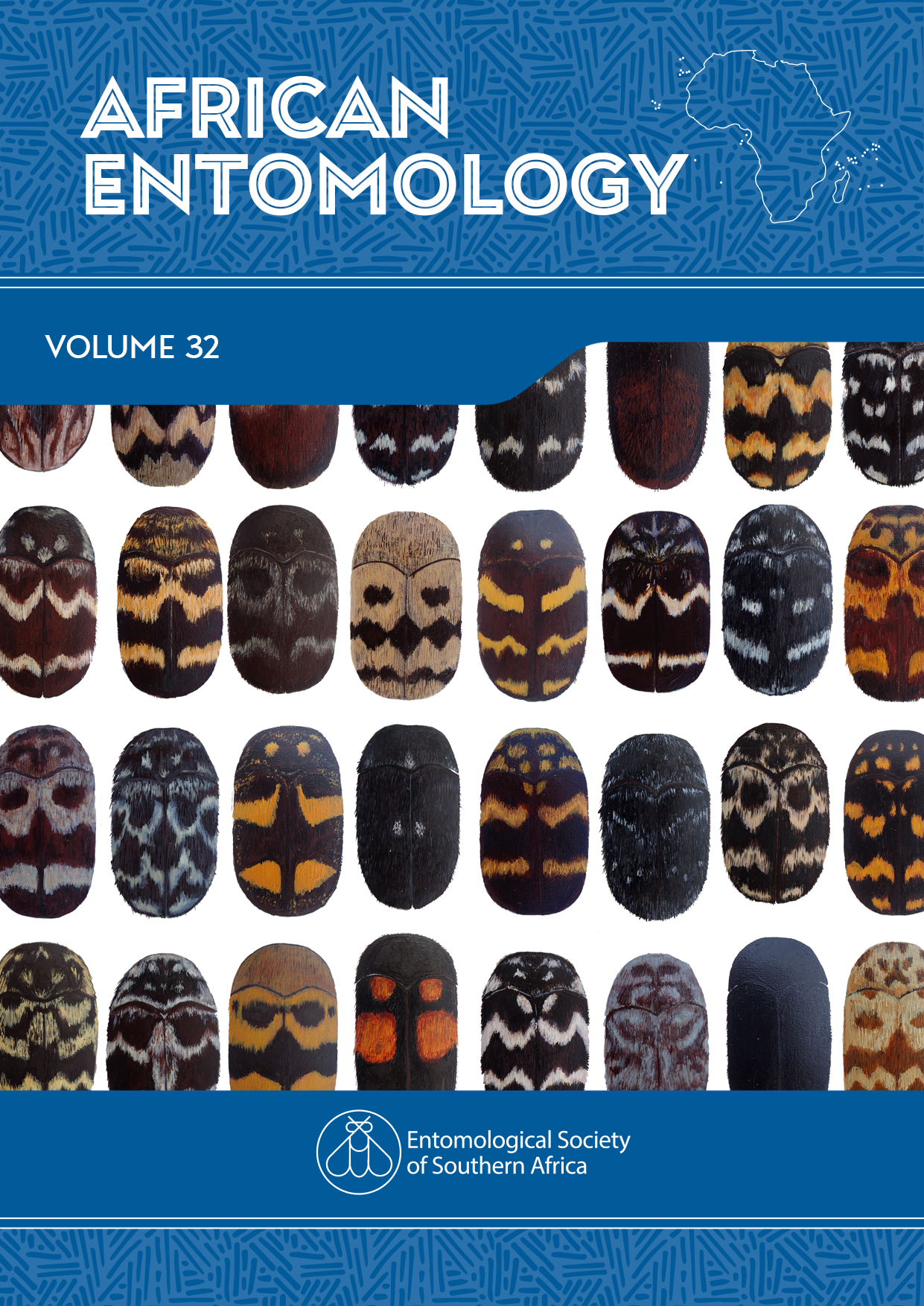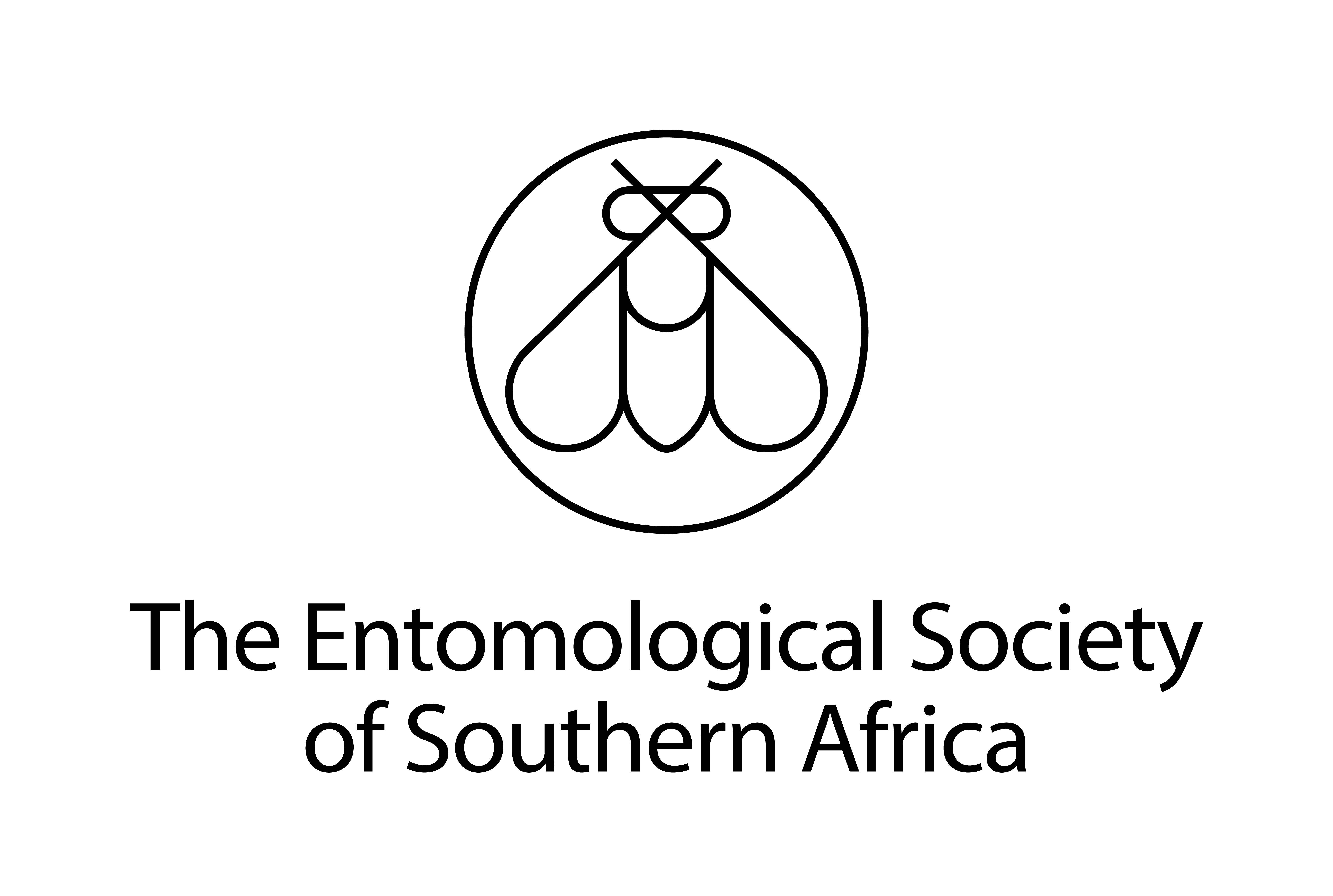Scarabaeolus carniphilus: a necrophagous dung beetle (Coleoptera: Scarabaeinae) buries and feeds on a dead snake
DOI:
https://doi.org/10.17159/2254-8854/2024/a15256Keywords:
necrophagous insects, Crotaphopeltis hotamboeiaAbstract
A rare sighting of two male carrion specialist dung beetles, Scarabaeolus carniphilus Deschodt & Davis, 2015, burying a freshly dead Herald snake (Crotaphopeltis hotamboeia (Laurenti, 1768)) is documented from its discovery in the field and subsequent reburial under laboratory conditions. The species studied is a member of the telecoprid (dung roller) Scarabaeini, but behaved here like a paracoprid; it deliberately cut into and removed flesh from the dead snake; these pieces were then taken into a feeding burrow; later a pheromone release stance was taken up near an established burrow; and under laboratory conditions the snake was completely buried. These observations, mostly novel for this species and its genus are clearly documented via photographs and an online time lapse video taken every hour for 24-hours during the snake’s-(re)burial. This note introduces relevant aspects of dung beetle natural history and new biological information for Scarabaeolus and particularly for Sc. carniphilus. It records and interprets a carrion specialist Scarabaeini dung beetle burying and feeding on fresh carrion; highlights natural history findings (pheromone release) previously not considered for the evolution of the Scarabaeini; and aims to stimulate behavioural research into this interesting and under studied genus Scarabaeolus.
Downloads
References
Bornemissza GF. 1969. A new type of brood care observed in the beetle Oniticellus cinctus (Scarabaeidae). Pedobiologia (Jena) 9(1):223–225. https://doi.org/10.1016/S0031-4056(23)00519-X
Bornemissza GF. 1976. The Australian dung beetle project 1965-1975. Australian Meat Research Committee Review 30:1–30.
Burger BV, Munro Z, Röth M, Spies HSC, Truter V, Tribe GD, Crewe RM. 1983. Studies on the pheromones of Scarabaeinae, I. Composition of the heterogeneous sex attracting secretion of the dung beetle, Kheper lamarcki. Zeitschrift für Naturforschung C 38(9–10):848–855. https://doi.org/10.1515/znc-1983-9-1028
Burger BV, Munro Z, Brandt WF. 1990. Pheromones of the Scarabaeinae, II. Composition of the pheromone disseminating carrier material secreted by male dung beetles of the genus Kheper. Zeitschrift für Naturforschung C 45(7–8):863–872. https://doi.org/10.1515/znc-1990-7-820
Burger BV, Petersen WGB. 1991. Semiochemicals of the Scarabaeinae, III. Identification of an attractant for the dung beetle Pachylomer[us] femoralis in the fruit of the spineless monkey orange tree, Strychnos madagascariensis. Zeitschrift für Naturforschung C 46(11–12):1073–1079. https://doi.org/10.1515/znc-1991-11-1224
Burger BV, Petersen WGB, Tribe GD. 1995. Semiochemicals of the Scarabaeinae, IV: identification of an attractant for the dung beetle Pachylomer[us] femoralis in the abdominal secretion of the dung beetle Kheper lamarcki. Zeitschrift für Naturforschung C 50(c):675–860.
Burger BV, Petersen WGB. 2002a. Semiochemicals of the Scarabaeinae, VI. Identification of EAD-active constituents of abdominal secretion of male dung beetle Kheper nigroaeneus. Journal of Chemical Ecology 28(3):501–513. https://doi.org/10.1023/A:1014583826875
Burger BV, Petersen WGB, Weber WG, Munro ZM. 2002b. Semiochemicals of the Scarabaeinae, VII. Identification and synthesis of EAD-active constituents of abdominal sex attracting secretion of the male dung beetle Kheper subaeneus. Journal of Chemical Ecology 28(12):2527–2539. https://doi.org/10.1023/A:1021440220329
Burger BV, Petersen WGB, Ewig BT, Neuhaus J, Tribe GD, Spies HSC, Burger WJG. 2008. Semiochemicals of the Scarabaeinae VIII: identification of active constituents of the abdominal sex-attracting secretion of the male dung beetle, Kheper bonellii, using gas chromatography with flame ionization and electroantennographic detection in parallel. Journal of Chromatography A 1186(1-2):245–253. https://doi.org/10.1016/j.chroma.2007.09.041
Byrne M, Dacke M, Nordström P, Scholtz C, Warrant E. 2003. Visual cues used by ball-rolling dung beetles for orientation. Journal of Comparative Physiology A 189:411–418. https://doi.org/10.1007/s00359-003-0415-1
Davis ALV, Frolov AV, Scholtz CH. 2008.The African Dung Beetle Genera. Pretoria, South Africa: Protea Book House.
Dacke M, El Jundi B, Gagnon Y, Yilmaz A, Byrne M, Baird E. 2020. A dung beetle that path integrates without the use of landmarks. Animal Cognition 23(6):1161–1175. https://doi.org/10.1007/s10071-020-01426-8
Doube BM. 1990. A functional classification for analysis of the structure of dung beetle assemblages. Ecological Entomology 15(4):371–383. https://doi.org/10.1111/j.1365-2311.1990.tb00820.x
Deschodt CM, Davis ALV, Scholtz CH. 2015. Status changes, new synonymies, key and descriptions of seven new species in the subgenus Scarabaeus (Scarabaeolus) Balthasar 1965 (Coleoptera: Scarabaeidae: Scarabaeinae). Zootaxa 3931(4):505–527. https://doi.org/10.11646/zootaxa.3931.4.3
Deschodt CM, Davis ALV, Scholtz CH. 2017. Three new species, a synonymy and taxonomic notes on southern African members of the dung beetle genera Scarabaeus s. str. Linnaeus, 1758 and Escarabaeus Zídek & Pokorný, 2011 (Scarabaeidae: Scarabaeinae). Journal of Natural History 51(5–6):299–316. https://doi.org/10.1080/00222933.2016.1261949
Delvare G, Huchet J-B. 2017. Brachymeria mochica, a new Neotropical species of Chalcididae (Hymenoptera: Chalcidoidea) discovered on the archaeological site of Huacas de Moche, Peru with a review of related species. Zootaxa 4290(1):43–60. https://doi.org/10.11646/zootaxa.4290.1.2
Forgie SA, Grebennikov VV, Scholtz CH. 2002. Revision of Sceliages Westwood, a millipede-eating genus of southern African dung beetles (Coleoptera, Scarabaeidae). Invertebrate Systematics 16(6):931–955. https://doi.org/10.1071/IT01025
Halffter G, Halffter V. 2009. Why and where coprophagous beetles eat seeds, fruits or vegetable detritus. Boletín de la Sociedad Entomológica Aragonesa 45:1–22.
Halffter G, Matthews EG. 1966. The natural history of dung beetles of the subfamily Scarabaeinae (Coleoptera, Scarabaeidae). Folio Entomològica Mexicana 12–14:1–312.
Hammond PM. 1976. Kleptoparasitic behaviour of Onthophagus suturalis Péringuey (Coleoptera, Scarabaeidae) and other dung beetles. The Coleopterist’s Bulletin 30:235–249.
Hanski I, Cambefort Y , editors. 1991. Dung Beetle Ecology. NJ, U.S.A.: Princeton University Press. https://doi.org/10.1515/9781400862092
Harrison, J du G, Philips TK. 2003. Phylogeny of Scarabaeus Pachysoma (MacLeay) stat.n. and related flightless Scarabaeini (Scarabaeidae, Scarabaeinae). Annals of Transvaal Museum 40:47–71.
Harrison J du G, Scholtz CH, Chown SL. 2003.A revision of the endemic south-western African dung beetle subgenus Scarabaeus (Pachysoma) Macleay, including notes on other flightless Scarabaeini (Scarabaeidae, Scarabaeinae). Journal of Natural History 37(3):305–355. https://doi.org/10.1080/713834683
Hertel F, Colli GR. 1998. The use of leaf-cutter ants, Atta laevigata (Smith) (Hymenoptera, Formicidae) as a substrate for oviposition by the dung beetle Canthon virens Mannerheim (Coleoptera, Scarabaeidae) in central Brazil. The Coleopterist’s Bulletin 52(2):105–108.
Klemperer HG. 1983. The evolution of parental behaviour in Scarabaeinae (Coleoptera, Scarabaeidae), an experimental approach. Ecological Entomology 8(1):49–59. https://doi.org/10.1111/j.1365-2311.1983.tb00482.x.
Mathikge NG. 2021. Understanding the role of specialized mouthparts in the selective feeding of dung beetles (Coleoptera: Scarabaeinae) [MSc thesis] Johannesburg, South Africa: University of the Witwatersrand.
Mcbride CJ. 1990. Liontide. Johannesburg, South Africa: Jonathan Ball Publishers.
Mills G, Mills M. 2010. Hyena nights and Kalahari days. Johannesburg, South Africa: Jacana.
Mostert LE, Scholtz CH. 1986. Systematics of the subtribe Scarabaeina (Coleoptera, Scarabaeinae). Entomology Memoir Department of Agriculture and Water Supply Republic of South Africa 65:1–25.
Owen-Smith RN. 1988. Megaherbivores, the influence of very large body size on ecology. Cambridge Studies in Ecology. Cambridge, UK: Cambridge University Press. https://doi.org/10.1017/CBO9780511565441
Pluot-Sigwalt D. 1982. Physiologie des invertébratés - diversité et dimorphisme sexuel de glandes tégumentaires abdominales chez les Coléoptères Scarabaeidae. Comptes rendus de l’Académie des Sciences Paris, Serie III 294: 945–948.
Pluot-Sigwalt D. 1983. Les glandes tégumentaires des Coléoptères Scarabaeidae, répartition des glandes sternales et pygidiales dans la famille. Bulletin de la Société Entomologique de France 88(7):597–602. https://doi.org/10.3406/bsef.1983.18092
Pluot-Sigwalt, D. 1986. Les glandes tégumentaires des Coléoptères Scarabaeidae, Structure et diversité des canalicules. Annales de la Société Entomologique de France (N.S.) 22(2): 163–182.
Pluot-Sigwalt, D. 1991. Le système glandulaire abdominal des Coléoptères coprophages Scarabaeidae, ses tendances évolutive et ses relations avec la nidification. Annales de la Société Entomologique de France (N.S.) 27: 205–229.
Pluot-Sigwalt, D. 1995. La diversité du systéme des glandes tégumentaires abdominales des Scarabaeidae (s. str.) (Coleoptera), morphologie et répartition des structures cuticulaires. Annales de la Société Entomologique de France (N.S.) 31(4): 295–348.
Scholtz CH. 1989. Unique foraging behaviour in Pachysoma (= Scarabaeus) striatum Castelnau (Coleoptera, Scarabaeidae), an adaptation to arid conditions? Journal of Arid Environments 16(3):305–313. https://doi.org/10.1016/S0140-1963(18)30946-7
Scholtz CH, Davis ALV, Kryger U. 2009. Evolutionary Biology and Conservation of Dung Beetles. Sofia, Bulgaria and Moscow, Russia: Pentsoft; p. 1–567.
Simmons LW, Ridsdill-Smith TJ, editors. 2011. Ecology and evolution of dung beetles. Oxford, UK: Wiley-Blackwell Publishing Ltd.
https://doi.org/10.1002/9781444342000
Tribe GD. 1975. Pheromone release by dung beetles (Coleoptera, Scarabaeidae). South African Journal of Science 71:277–278.
Tribe GD. 1976. The ecology and ethology of ball-rolling dung beetles (Coleoptera, Scarabaeidae) [MSc thesis] Pietermaritzburg, South Africa: University of Natal.
Vaz-de-Mello FZ. 2007. Revision and phylogeny of the dung beetle genus Zonocopris Arrow, 1932 (Coleoptera, Scarabaeidae, Scarabaeinae), a phoretic of land snails. Annales de la Société Entomologique de France 43(2):231–239. https://doi.org/10.1080/00379271.2007.10697516
Downloads
Additional Files
Published
Issue
Section
License
Copyright (c) 2024 James Harrison, Marcus J. Byrne, Clarke H. Scholtz, Emily Baird, Claudia Tocco, Nellie Linander, Marie Dacke

This work is licensed under a Creative Commons Attribution 4.0 International License.




.png)